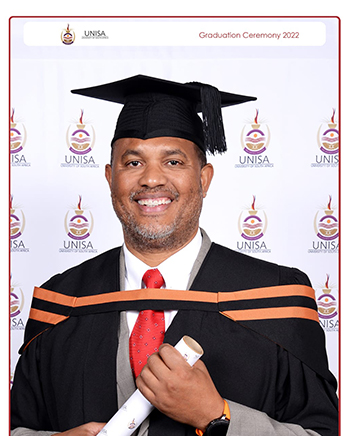News & Events
"Unisa has an excellent support structure"
Recognition of Prior Learning (RPL) is the formal acknowledgement of people's knowledge, skills, competence, expertise, and capabilities due to prior learning that may have occurred through formal, informal, or non-formal learning. RPL allows individuals to gain credits within Unisa's qualifications based on their knowledge level and extent. Zane Oswald Cleophas is one of the successful students who went through the College of Law's RPL process. He shares his experience below:

Zane Cleophas
How did you learn about Unisa's RPL process?
I have a military background and have worked in various government positions. When I was a member of the security cluster community, we were invited to a breakfast for industry professionals at Unisa. In 2017, I was invited to another one, where I talked with Professor Krisandren Pillay and Professor Olaotse Kole. Prof Kole followed up our conversation with a meeting, during which he enquired about my aspirations, what I wanted to achieve, and my background, and he was immediately interested.
He indicated that with a background as vast as mine, I would make an ideal RPL candidate, and he started taking me through how to apply.
How did you become an RPL candidate?
My passion for technology drew me into the ever-changing landscape of security. I had some military qualifications and qualifications from other environments, which included several short courses and postgraduate courses, among other things; however, nothing was formalised to support security functions.
Which industry do you work in, and how is RPL relevant?
I have worked in the security and military sectors; formalising a qualification is ultimately essential. The contribution, you could say, to this point in time is that we continue to consult and design technologies and provision technologies within the security cluster and intelligence space, as you are regarded as an expert in your field and a knowledgeable person within a specific field of interest.
As a student who gained access to Unisa through RPL, how did you cope with the demands of undergraduate/postgraduate studies?
It was a difficult journey. 2017 started as a high mountain to climb. It would have been a much higher mountain to climb if it had not been for the dedicated and professional Unisa staff, Prof Kole, Prof Krishna and Muhle Lewis, the RPL Academic Coordinator for the College of Law, who were present at the start of my journey. Surmounting all of the administrative parts of the process was tedious, but it was also filled with excitement and an equal amount of nervousness leading up to obtaining my master's qualification while juggling family life, work and studies.
Things were even more difficult for me because I own a business that had also been affected by the Covid-19 pandemic, which lasted nearly two years. Many of our clientele are outside South Africa's borders, making it challenging to maintain business. However, I was dedicated enough to complete my studies, which I did successfully under the supervision of Prof Kole.
An important thing to remember when starting a process like this is to avoid making major life decisions during this time, which everyone warned me about when we moved provinces. Strong family structures are essential on this journey, but so too is having a supervisor who will support you throughout the process.
What was the focus of your research?
My master's thesis researched the impact of information security breaches in the security sector. It was a full dissertation, and my topic was: The Impact of Social Engineering on Information Security Breaches. I did a case study of selected private security companies in Tshwane, combining my love of technology with my passion for information security. During my research, I discovered that one can build all kinds of beautiful technologies and safeguards; however, without people, processes and technology working together, one will undoubtedly have holes in the system. I discovered that the human element remains a critical component in information security.
Where to, from here?
I believe Unisa is at the forefront of providing cutting-edge education in this transformative world of security manufacturing. My research will help contribute to that, as will my current pursuit of a PhD.
I'm delving further into how a pandemic influences information security, but I'm specifically interested in how we can create a response model that is sustainable for any form of pandemic and not just necessarily the Covid-19 pandemic that we've experienced.
What is your message of encouragement to students?
A journey of a thousand miles starts with the first step. Looking back, I failed many attempts and didn't even take the first step of applying for RPL because it's an arduous and time-consuming process. During this period, I was promoted and eventually became a chief director. I also served as deputy director general for a while. I mention this because my workload became so heavy that it was easy to use it as an excuse for my procrastination; it happens, but students should know that they are not alone. Unisa has an excellent support structure in the academic environment and student administration. The College of Law also goes out of its way to support postgraduate students. Students should also remember that balancing family, work and studies is critical.
My advice to students is to fully utilise the student support network to connect with other students in similar situations, as none of the circumstances they find themselves in as students are unique to one individual.
*Interview by Muhle Lewis, RPL Coordinator, College of Law
Publish date: 2024/02/27
